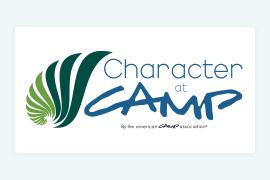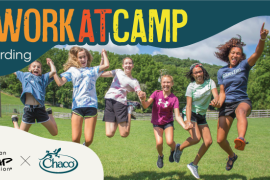The first-ever fully virtual ACA National Conference took place earlier this month, and thanks to our research partner, Redwoods, we had a full day of panels and ignite sessions dedicated to the growing body of camp research. Now I know we researchers often have a reputation for being lofty academics hanging out in sterile labs talking about abstract ideas that sound impossible to put into practice. But one of the wonderful things curators Ann Gillard, PhD, and Laurie Browne, PhD, and ACA’s Committee for the Advancement of Research and Evaluation (CARE) emphasize when organizing these sessions is implications for camp practitioners. That means everyone presenting in the research forum is dedicated to translating their work into real-world, boots-on-the-ground practices that will help camp practitioners improve programming, solicit funding, and face ongoing challenges with evidence-based solutions. So, in case you missed it, I’m here to fill you in on my big takeaways from each session.
With Great Challenges Come Great Innovations
The effects of COVID-19 on the camp industry were undoubtedly a hot topic at this year’s conference, and the research forum was no different. In fact, the day kicked off with a special panel, "COVID-19 Lessons for Summer Camps," that highlighted four research projects that focused on different aspects of the pandemic and its impacts on camp: camp health care practices, programmatic decision-making processes, differential impacts on summer experiences of children from income-stratified families, and early camp program planning. Throughout the presentations and the discussion that followed, three big themes emerged. Firstly, an emphasis on a multi-layered approach to COVID-19 prevention practices. Questions abounded about cohort sizes, masks, and social distancing protocols and more. What was the most effective and how was it implemented? What it all boiled down to was the need for implementing multiple preventive practices, not just one practice deemed most effective. Secondly, though we may hate to hear it, the early bird gets the worm. The presenters highlighted the benefits of making a decision as early as possible, allowing more time for program planning, and this was reiterated with case studies and personal comments in the chat box from attendees. And lastly, communicate early, communicate often, and communicate in diverse ways. Even if you’re not entirely sure what’s happening, parents will like knowing that line of communication is open and functioning.
Camp as a Context for Young Adult Development
While so much of our attention is focused on the youth and participants taking part in our camp programs, a growing number of researchers are dedicating their time to investigating the ways in which camp employment affects frontline staff. This year, in the "Issues Facing Camp Staff" ignite session, we were fortunate enough to have four projects dedicated to the health, practices, and outcomes of camp staff, ranging from sun safety and medicine distribution practices to emerging adult development and staff retention. Pulling all of these projects together, Karla Henderson, PhD, chair of ACA’s Research Advisory Committee, drew our awareness to the insightful point that, if our goal for campers is to send them out into the world as more well-rounded individuals prepared to face the worlds challenges, shouldn’t that be the same for staff as well? This helped shift the conversation from camp staff retention to camp as a context for young adult development and the ways camps can support staff in their own learning and leadership development as they transition into careers both within as well as outside of the camp industry. Again, while we don’t see as much research on camp staff yet, it’s obvious that the tide is turning, so be on the lookout for more on this topic in the future!
Promoting Equity in Camps Is an Ongoing Effort
Another hot topic at this year’s conference, evidenced in the "Camp Includes Me" track, was issues surrounding diversity, equity, and inclusion in camps, and this was mirrored in the research forum’s third ignite session, "Promoting Equity in Camps." Projects in this session included: Marge Scanlin Outstanding Student Research Award Winner Jessie Dickerson, whose work is opening the door for a new line of research into factors that constrain families’ access to summer camp; the ways in which recreation providers can address summertime food insecurity; a deep dive into the experiences of underserved youth at an overnight summer camp; and strategies for youth and adult collaborative development of identity-safe communities. After the research presentations, much of the conversation focused on parent anxiety and diverse constraints, or barriers, families face when sending their kids to camp. This was followed by a few strategies for alleviating parent anxiety, such as the intergenerational mentoring model, year-round engagement, and financial support mentioned by Jennifer Rubin. Browne also asked about honoring the lived experience of youth who face more challenges in accessing camp (such as low-income youth) and indeed this was recognized as an emerging approach. That is, acknowledging the differences in lived experiences, and treating those differences as something valuable that can be learned from. Again, much like the emerging research on staff impacts, I think there’s a lot more on the horizon when it comes to research on diversity, equity, and inclusion in camps.
The Important Role of Nonfamilial Adults and Building a Sense of Community in Promoting Positive Youth Experiences and Outcomes
The final ignite session, "Youth Outcomes of the Camp Experience," brought us back to the heart of camp research; that is, promoting positive youth experiences and outcomes. Projects in this session looked at diverse aspects of the camp experience and how they relate to theory, youth outcomes generally, and military connected youth, as well as key strategies for building youth-adult partnerships and a sense of community in online camps. To that end, a key theme that emerged across their presentations and the Q&A session that followed was the important role that non-familial adults and a sense of community play in promoting positive youth experiences and outcomes. When asked what are the ways that camps can generate possible sparks (according to one of the panelists, Victoria Povilaitis, "sparks" are talents or interests that give youth joy and energy) through programming, each of the panelists highlighted one of these two elements. More specifically, Povilaitis stressed supportive relationships with non-familial adults like camp staff and counselors, Deb Jordan emphasized the need for campers’ sense of belongingness (whether they’re attending a specialty camp or a more traditional camp), Megan Owens highlighted opportunities for virtual connections with adult mentors that may not be accessible via normal in-person programming, and Allie Tung circled back to nonfamilial adults and the benefits of learning new skills alongside campers.
"Research Social" Is Not an Oxymoron!
As the research forum wrapped up, researchers and practitioners alike gathered for a virtual celebration of excellence in camp research and evaluation, and enthusiasm for what’s still to come. Award winners Dickerson (Marge Scanlin Award for Outstanding Student Research) and Laura Blaisdell, MD/MPH, FAAP (Eleanor P. Eells Award for Excellence in Evaluation & Research) were acknowledged for their contributions to the field over the last year, and the event continued with as conviviality as zoom would allow! While reflected in all of the panels throughout the day, what struck me about this event was the warm and inviting nature of this community of camp enthusiasts. Anyone was welcomed, whether they were working for a camp or a university or some other agency invested in the field, whether it was their first conference or their 20th conference, old relationships were revived and new relationships were built. Not that I had any doubts, but I think the future of camp research is bright indeed. And I hope you’ll join us next year as we work continue toward strengthening this already growing research-practice relationship!
Want to learn more about these studies? Check out the full book of abstracts here.
Thanks to our research partner, Redwoods.
Additional thanks goes to our research supporter, Chaco.





